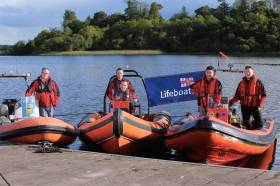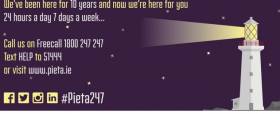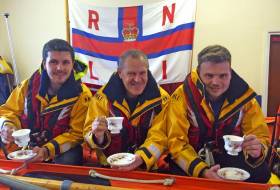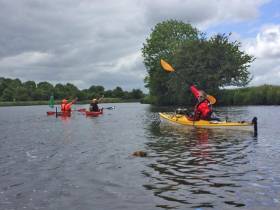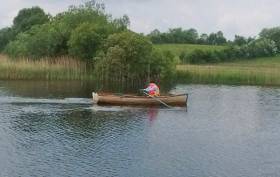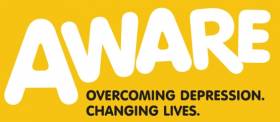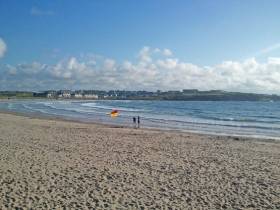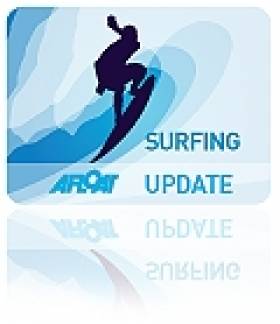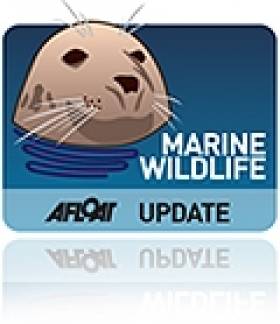Displaying items by tag: Charity
Round Ireland RIB Run For Worthy Causes This Month
#RIBs - A team of intrepid boaters from the Lakelands are prepping for a round-Ireland RIB run this month in aid of three worthy causes.
Joe Gavin and Kevin McCaffrey will be joined by friends Dermot McGuire, Damien Mundy and Stephen Leddy as they set out on two RIBs from Greystones on 20 June heading clockwise around Ireland, raising funds for the RNLI and two Irish charities, Time For Tilara and Chloe Standing Tall.
The RIB runners have scheduled stops at Rosslare, Crosshaven, Sherkin Island, Dingle, Lahinch, Clifden, Belmullet, Burtonport, Downings, Portrush and Donaghadee before their return to Greystones on 1 July.
All donations received will go direct to the three charities, and the team would be pleased to receive any support along the way — even by joining the run for a spell in your own vessel.
The Facebook page has more on the fundraising challenge HERE.
Top Rowers Pull Together for Pieta House
#Rowing: A group of Ireland’s top rowers are hosting a special charity event this Sunday. The Run to Row at the National Rowing Centre in Farran Woods park in Cork is being held to raise funds for Pieta House, the charity which deals with people have suicidal ideation or who self-harm. There are prizes for families and for individuals who take part. Irish internationals Shane O’Driscoll, Mark O’Donovan and Sanita Puspure are behind the drive. “It’s alarming to hear of young people taking their own lives,” Puspure said. “All the funds from Sunday will go to Pieta House. There is a real need there.”
Larne Lifeboat Station To Open Its Doors For Macmillan Coffee Morning
#RNLI - Larne RNLI's volunteer crew are throwing open the doors of their lifeboat station this coming Friday 30 September as they host a coffee morning to raise funds for Macmillan, the cancer support charity.
Doors open at 10am at 11 Olderfleet Road and the crew are already planning a 'bake off' to entice the public along and to dig deep for the charity.
The main organiser of the fundraiser is Larne RNLI lifeboat mechanic Derek Rea, who lost his uncle to cancer when he was younger and has had some close friends battle the illness.
It is a cause that is close to the heart of the entire station. Second coxswain Norman Surplus recently had his own battle with the disease and raised funds for cancer charities when he flew his gyrocopter round the world last year.
Commenting on the fundraising event, Rea said: "This will be a fundraiser with a difference for us here. As a charity we are thankful to the people of Larne for supporting the lifeboat but we also want to help others and raise funds for this worthy cause.
"There is hardly a person whose life has not been touched by cancer, either through battling it themselves or seeing someone they care about suffering with it. Support for cancer sufferers and research into treatment is ongoing and the Macmillan coffee morning is a great way to raise awareness and funds for this work."
Learn more about the Macmillan coffee morning fundraisers HERE.
Charity Kayakers On Epic Shannon Paddle
#Kayaking - A trio of intrepid kayakers have reached Carrick-on-Shannon this afternoon (Thursday 16 June) on the second day of their long-distance charity paddle along length of the Shannon from Lough Erne to Killaloe.
Ger Harrington, Peter Brewitt and James Lynch hope to complete the 220km challenge by this Sunday 19 June in aid of the Irish Motor Neurone Disease Association, as the Clare Herald reports.
All three are experienced on the water, Harrington and Brewitt being longtime kayakers and Lynch being the first person to swim in the length of Lough Derg two years ago.
The team are posting regular updates on their journey on their Facebook page while raising funds for the charity that helped Harrington's late mother in her final months in 2012.
'5 At 85' No Sweat In Charity Rowing Challenge
#Rowing - Not content with rowing 80km for his 80th birthday, Donnaca Kennedy took advantage of the good weather for another fundraising row to mark his 85th this summer.
The former Weaver Boats proprietor, who will be familiar to many veteran Shannon boaters, aims to raise money for the North West Cancer Hospice and the Ethiopian Cancer Squad via his latest endeavour.
Originally planned for this June Bank Holiday weekend, Kennedy seized on the perfect rowing conditions last Sunday 29 May for the five-mile run from Carrick-on-Shannon to the Boyle River.
But he's still welcoming donations for his chosen charities, both close to his heart.
After spending some time under the care of the team at the North West Hospice, Kennedy has first-hand experience of how important this service is for those in need, according to his daughter Úna who's been getting the word out about his plans.
To read more about his row and the charities involved, visit his blog at 5at85.blogspot.ie.
#Surfing - Surfers from across the North West paired up to take part in a unique event to raise money for mental health charity Aware NI last week.
The money raised at the tandem surfing competition, run by Portrush-based surfing school Troggs, will help Award NI provide vital services for people affected by depression across Northern Ireland.
Teams of surfers took to Portrush East Strand on Sunday 20 March to perform tricks and manoeuvres in pairs in an attempt to impress the experienced judges.
The tandem surfing competition, the first of its kind in Northern Ireland, raised over £300 (€372) for Aware NI.
The event was the brainchild of Carl Russell, owner of Troggs Surf School, after some of his own clients recommended the benefits of surfers in overcoming the own depression.
“The idea came about from my brother Jamie Russell and I realising that we could experience surfing together on the same board when surf conditions weren’t favourable for our shortboards,” he said.
“We ended up having as much fun if not more tandem surfing as we did surfing normally. Then the link for the competition was made to show that the proven research that surfing helps depression is a real tool that can be used."
Russell explained that surfing "has had positive effect on people and clients of ours with mental health issues which is why we have chosen this charity, plus this professional organisation really helps people.
"We run custom surf programmes for groups affected by the issues mentioned. Our event is due to run again September-October 2016 and will be even bigger.
“Thanks to all our sponsors gregwallace.co.uk, garymccall.co.uk, couconoutdoor.com, Brew Note Portrush & AC Electronics Coleraine.
Only last year the French seaside town of Biarritz become the first in the world to prescribe surfing lessons as a way to treat depression to heart disease.
Some 20 doctors are taking part in a pilot scheme in Europe’s surf capital to encourage the notoriously pill-popping French to cut back on medication and take to the waves.
“Aware fully endorse the message that physical exercise cannot only improve your physical health but also your mental health,” said Kieran Hughes, fundraising officer at Aware NI.
“The benefits of physical exercise for mental health are widely recognised and surfing is one of the best examples of that. Participants are getting excellent exercise but also getting out in the open and close to nature which can only be a positive thing.
“We would like to sincerely thank Carl and everyone at Troggs Surf School for raising money for Aware. All the money raised will go towards Aware’s Support Services and education programmes to help people affected by depression across Northern Ireland.”
Charity Tandem Surf In Portrush This Sunday
#Surfing - Sign-ups are still welcome for a charity tandem surfing competition in Portrush this coming weekend, as the Coleraine Times reports.
Waveriders will be lining up two-by-two on the East Strand this Sunday 20 March for the charity event in aid of Aware NI, the only mental health charity in Northern Ireland focusing on depression and bipolar disorder.
It's one of a number of events over St Patrick's Weekend in aid of mental health support, with Aware in the Republic hosting its annual Harbour2Harbour walk around Dublin Bay this Thursday 17 March.
Similar walks will be taking place on St Patrick's Day morning at Cork Harbour (details) and at Salthill in Galway (more here).
SuperValu Sutton Chooses Howth RNLI As 'Charity Of The Year'
#RNLI - Howth RNLI was unveiled this week as SuperValu Sutton’s Charity of the Year for 2016.
A series of fundraising activities will take place in store throughout 2016 to support the work of the local lifeboat station, contributing to the training of the volunteer lifeboat crew members, the provision of lifejackets and crew kit, the maintenance of the two lifeboats and the station's running costs.
Rose Michael, chair of the Howth RNLI fundraising branch, expressed her thanks and gratitude to the management, staff and customers for their support.
"We are delighted to be announcing a local fundraising partnership with SuperValu Sutton," she said. :Their support and the generosity of their customers will help us to continue our lifesaving work in the community this year.
"We have a fantastic group of people who devote their time and energy, and make sacrifices to enable us to launch the lifeboats. Our volunteer crew are incredibly brave and we want to make sure that when they go to sea to save lives that they are highly trained with the best of equipment.
"When they go out on a recue they don’t know what risks they will face, and it is our priority that they come home safely."
Neville Raethorne, store manager at SuperValu Sutton, also commented: "The lifeboat in Howth provides an important service to our customers in the locality and many of the crew members shop here. We look forward to developing a successful fundraising partnership with Howth RNLI over the coming year."
With 60 launches, rescuing 58 people, Howth RNLI was the busiest coastal lifeboat station in Ireland in 2015 – a year that saw stations nationwide launch to more than 1,000 incidents.
NI Surfers Wanted To Help Break Unique World Record
#Surfing - The Belfast Telegraph reports that surfers across Northern Ireland are being sought to help break a unique surfing world record later this year.
Portrush surf school proprietor Carl Russell is planning the bid to set a new record for the most people standing on the same wave at the same time - currently standing at 110 surfers, set in South Africa in 2009.
Stability will be crucial to the challenge, so only surfers of intermediate level up need apply.
But with surfing becoming such a popular pastime around Ireland's coastline, finding enough participants should be less difficult than ever before.
And the record aside, the attempt is a great opportunity to raise funds for the RNLI, following the £600 raised for the lifeboat charity last year.
The Belfast Telegraph has more on the story HERE.
IWDG Can Make A Difference In Today FM's Donation Drive
#MarineWildlife - The Irish Whale and Dolphin Group (IWDG) is one of the many charities in the running for an award of up to €10,000 in Today FM's 1% Difference Campaign.
The campaign is encouraging Irish people to give either 1% of their income of !% of their time towards a cause they believe in.
And the IWDG is looking for its supporters to give it the backing it needs - both financial pledges, and moral support via online votes - to reach first place and a prize that includes a €10,000 radio ad campaign on Today FM.
The IWDG is dedicated to the conservation and better understanding of whales, dolphins and porpoise in Irish waters, which comprise a dedicated sanctuary for cetaceans.
The group now offers whale-watching trips to members onboard its new vessel Celtic Mist to help support its invaluable work in protecting Ireland's marine wildlife.



























